
MERKUR-DEUTSCHE ZEITSCHRIFT FUR EUROPAISCHES DENKEN
Scope & Guideline
Illuminating Intellectual Traditions in Europe
Introduction
Aims and Scopes
- Interdisciplinary Exploration:
The journal emphasizes interdisciplinary approaches, integrating philosophy, sociology, history, and cultural studies to analyze complex contemporary issues. - Critical Examination of European Identity:
A core focus is on the concept of European identity, exploring its evolution, challenges, and influences from historical events and cultural movements. - Philosophical Inquiry:
MERKUR encourages philosophical discourse, particularly regarding ethics, democracy, and human rights, often reflecting on their implications in modern contexts. - Cultural Critique:
The journal provides critiques of cultural phenomena, including literature, art, and media, examining their roles in shaping societal narratives. - Historical Contextualization:
A consistent theme is the contextualization of current events within historical frameworks, fostering a deeper understanding of contemporary crises.
Trending and Emerging
- Climate Change and Ecological Discourse:
Increasingly, articles are addressing climate change and ecological issues, reflecting a growing concern for environmental crises and their philosophical implications. - Digital Transformation and Society:
The impact of digital technologies on society, including discussions on artificial intelligence and digital culture, has become a prominent theme, showcasing the journal's engagement with modern technological challenges. - Memory Politics and Historical Remembrance:
There is a notable rise in discussions surrounding memory politics, especially in relation to historical events and their contemporary interpretations, indicating a focus on how history shapes current identities. - Identity Politics and Social Movements:
Emerging themes related to identity politics, including race, gender, and sexuality, are increasingly prevalent, reflecting the journal's commitment to addressing social justice issues. - Crisis of Democracy and Governance:
A trend towards analyzing the crisis of democracy, governance, and populism is evident, suggesting a critical examination of political structures and their societal impacts.
Declining or Waning
- Traditional National Histories:
There appears to be a decreasing emphasis on traditional national histories, with fewer articles focusing solely on national narratives without the context of wider European or global implications. - Abstract Theoretical Discourses:
The journal seems to be moving away from purely abstract theoretical discussions that lack practical applications or relevance to contemporary issues. - Conventional Literary Criticism:
There is a noticeable decline in conventional literary criticism, particularly that which does not engage with broader socio-political themes or historical contexts. - Focus on Pure Aestheticism:
The journal is less frequently addressing themes centered solely on aesthetics without tying them to political or social critiques, indicating a shift towards more engaged scholarship. - Overly Specialized Topics:
Topics that are highly specialized and niche-oriented have become less common, possibly in favor of broader themes that resonate with wider audiences.
Similar Journals

Revista de Filosofia La Plata
Illuminating the Path of Philosophical ResearchRevista de Filosofia La Plata is a distinguished academic journal dedicated to the exploration and dissemination of philosophical thought and research. Published by the Universidad Nacional de La Plata within the Facultad de Humanidades y Ciencias de la Educación, this journal serves as a vital platform for scholars, practitioners, and students interested in various branches of philosophy, including but not limited to ethics, metaphysics, and social philosophy. With its commitment to Open Access, Revista de Filosofia La Plata ensures that valuable philosophical insights and discussions are accessible to a global audience, fostering rigorous debate and academic inquiry. Located in the heart of Buenos Aires, Argentina, this journal not only enhances regional scholarly dialogue but also contributes to the international landscape of philosophical research. Engaging with contemporary and classical philosophical issues, it aims to inspire new perspectives and guide future ethical and theoretical considerations in academia and beyond.

Daimon-Revista Internacional de Filosofia
Elevating Philosophical Research WorldwideDaimon-Revista Internacional de Filosofia is a prominent academic journal published by Universidad de Murcia, dedicated to the field of philosophy. As an Open Access journal since 1989, it aims to democratize knowledge and ensure that philosophical discourse reaches a global audience, fostering a vibrant exchange of ideas among scholars, researchers, and students. With an impact factor reflected in its classification as Q2 in the 2023 Philosophy category, it ranks #441 out of 806 journals in the Scopus database, indicating a notable influence within the arts and humanities sector. Covering a diverse range of topics in philosophy, Daimon emphasizes original research and critical engagement, making it an essential resource for those looking to stay abreast of contemporary philosophical debates and advancements. Located in Spain, at the Edificio Pleiades, Campus de Espinardo, Murcia, the journal seeks to contribute to the ongoing conversation in philosophical thought, paralleling its convergence from 2011 to 2024 with emerging themes and trends in the discipline.

STUDIES IN EAST EUROPEAN THOUGHT
Fostering Scholarly Discourse on Eastern European IdeologiesSTUDIES IN EAST EUROPEAN THOUGHT is a premier academic journal published by Springer, focusing on the multifaceted intellectual heritage and cultural dynamics of Eastern Europe. Established in 1993, this journal has been a significant platform for scholarly discourse, promoting interdisciplinary research across the fields of Cultural Studies, Law, Literature, Philosophy, and Social Sciences. With an impressive impact reflected in its Scopus rankings, including a Q1 categorization in Literature and Literary Theory and a Q2 standing in Cultural Studies and Law, it remains at the forefront of academic research, contributing to the global understanding of Eastern European perspectives. The journal is available in both print (ISSN: 0925-9392) and electronic (E-ISSN: 1573-0948) formats, with a committed audience of researchers, professionals, and students eager to explore the intricacies of Eastern European thought. By engaging with diverse methodologies and contemporary issues, STUDIES IN EAST EUROPEAN THOUGHT continues to shape the academic landscape and elevate scholarly discussions surrounding this vibrant region.
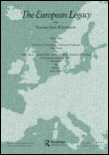
European Legacy-Toward New Paradigms
Redefining Heritage: Insights for Today’s ScholarsEuropean Legacy-Toward New Paradigms is a distinguished academic journal published by Routledge Journals, Taylor & Francis Ltd, focusing on interdisciplinary approaches to cultural studies, history, and philosophy. With an ISSN of 1084-8770 and an E-ISSN of 1470-1316, this journal has made significant contributions to the understanding of European heritage and its impact on contemporary thought and society since its inception in 2001. It currently holds a Q3 ranking in Cultural Studies, History, and Philosophy, reflecting its relevance and scholarly impact within the academic community. Although not an Open Access journal, European Legacy provides valuable insights and research findings through its carefully curated articles, making it an essential resource for researchers, professionals, and students alike. The journal's commitment to exploring new paradigms fosters critical dialogue and encourages innovative perspectives on Europe’s complex legacies, thereby positioning itself as a vital platform for ongoing academic discourse.
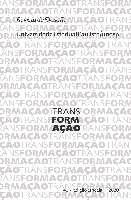
Trans-Form-Acao
Fostering Innovative Thought in HumanitiesTrans-Form-Acao is a prominent Open Access journal published by UNESP-MARILIA, dedicated to the field of Philosophy. Since its inception in 1974, the journal has fostered a vibrant academic discourse within the humanities, encouraging scholars to share innovative ideas and critical analyses. With an ISSN of 0101-3173 and an E-ISSN of 1980-539X, it has gained significant recognition in Scopus, ranking #285 out of 806 in the Arts and Humanities category, placing it in the 64th percentile for philosophy journals (2023). The journal's commitment to accessibility and rigorous scholarship has positioned it within the Q3 quartile, reflecting its growing influence and esteem in philosophical studies. Scholarly contributions are welcome across a range of philosophical topics, making it an essential resource for researchers, professionals, and students alike who seek to engage with contemporary philosophical thought. For further details, please refer to their address at AV HYGINO MUZZI FILHO, 737, MARILIA, SP 17525-900, BRAZIL.
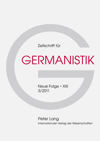
ZEITSCHRIFT FUR GERMANISTIK
Advancing Scholarly Discourse in Germanic StudiesZEITSCHRIFT FUR GERMANISTIK, published by PETER LANG GMBH, is a distinguished academic journal that serves as a vital resource in the fields of German studies, literature, linguistics, and cultural analysis. With an ISSN of 0323-7982, this journal provides critical insights and promotes scholarly discourse surrounding the evolving landscapes of German language and literature. Although it operates under a traditional access model, readers and researchers benefit from its rigorous peer-reviewed articles that span decades of intellectual inquiry. Historically featured in Scopus, the journal is noted for its impactful contributions, ranking 244th in Literature and Literary Theory and 406th in Linguistics and Language, highlighting its importance in the academic community. Situated in Bern, Switzerland, ZEITSCHRIFT FUR GERMANISTIK not only caters to scholars seeking to enrich their understanding of Germanic studies but also aims to bridge gaps across interdisciplinary borders, fostering a deeper appreciation of the cultural narratives that shape our world.

RENAISSANCE AND REFORMATION
Advancing Scholarship in Renaissance and Reformation StudiesRENAISSANCE AND REFORMATION is a distinguished academic journal that serves as a vital resource in the fields of history, literature, arts, and philosophy, with a specific focus on the expansive cultural shifts from the Renaissance to the Reformation. Published in Canada, this journal provides scholars, students, and professionals with an avenue to explore the intricate dynamics that shaped early modern thought and practice. While it is not an open access publication, it maintains a commitment to high academic standards, reflected in its diverse range of quartile placements across various categories, including Q3 in Literature and Literary Theory and Q4 in History. The journal is crucial for advancing scholarly discourse on early modern studies and facilitates a deeper understanding of the cultural and intellectual transformations that occurred during this pivotal historical period. RENAISSANCE AND REFORMATION continues to attract contributions from leading researchers and emerging scholars alike, making it an essential read for anyone invested in the complexities of historical thought and artistic expression.
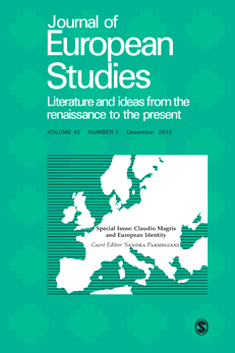
JOURNAL OF EUROPEAN STUDIES
Fostering Interdisciplinary Insights into European DynamicsThe JOURNAL OF EUROPEAN STUDIES, published by SAGE PUBLICATIONS LTD, is a prominent peer-reviewed journal that has critically engaged with the complexities of European society, culture, and politics since its inception in 1971. With its ISSN 0047-2441 and E-ISSN 1740-2379, this journal aims to foster interdisciplinary dialogue and scholarship, addressing contemporary issues while framing them within historical contexts. As a recognized publication in the field of Arts and Humanities, with a 2023 Scopus Rank of #331 and a percentile of 40, the journal is positioned in the Q3 category, signifying its contribution to the evolving landscape of European studies. Researchers, professionals, and students alike benefit from its curated content that invites both foundational research and innovative perspectives. Although the journal is not classified as Open Access, it remains a vital resource for those pursuing an in-depth understanding of European dynamics. The editorial board continuously endeavors to advance the study of Europe through rigorous scholarship, making it an essential platform for intellectual discourse.
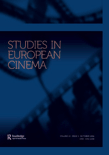
Studies in European Cinema
Enriching the Dialogue on European Cinematic PracticesStudies in European Cinema is an esteemed journal published by Routledge Journals, Taylor & Francis Ltd, focusing on the multifaceted realms of European cinema and its contextual relevance. With an ISSN of 1741-1548 and an E-ISSN of 2040-0594, this journal provides a dynamic platform for researchers and practitioners in the fields of Communication, Visual Arts, and Performing Arts. As reflected by its recent Scopus rankings, it holds a respectable position in the Arts and Humanities with an 84th percentile rank, indicating its significance and impact in the scholarly community. While not entirely open access, Studies in European Cinema seeks to foster critical discourse and analysis from 2004 to 2024, covering a broad spectrum of topics related to film studies, cultural representations, and the evolving narratives within European cinematic practices. Engaging with diverse theoretical frameworks, the journal aims to contribute to the vibrant dialogue surrounding European cinema, making it an essential resource for academics, filmmakers, and students alike who are passionate about exploring cinematic expression in a European context.

Revue de Synthese
Exploring the Depths of Philosophical DiscourseRevue de Synthèse, published by BRILL, is a distinguished journal in the field of Philosophy, recognized for its rich academic tradition since its inception in 1950. With an impressive history of converged years and a steady commitment to philosophical discourse, the journal offers a platform for scholars to present innovative ideas and critical analyses. Although currently listed in Q4 of the 2023 category quartiles, it serves as an essential resource for those pursuing interdisciplinary studies, enriching the philosophical landscape amidst global intellectual challenges. The journal is not currently available as Open Access, making its curated content accessible through institutional subscriptions. With an ISSN of 0035-1776 and E-ISSN of 1955-2343, Revue de Synthèse aims to empower researchers, professionals, and students alike with transformative insights that advance the understanding of contemporary philosophical issues.